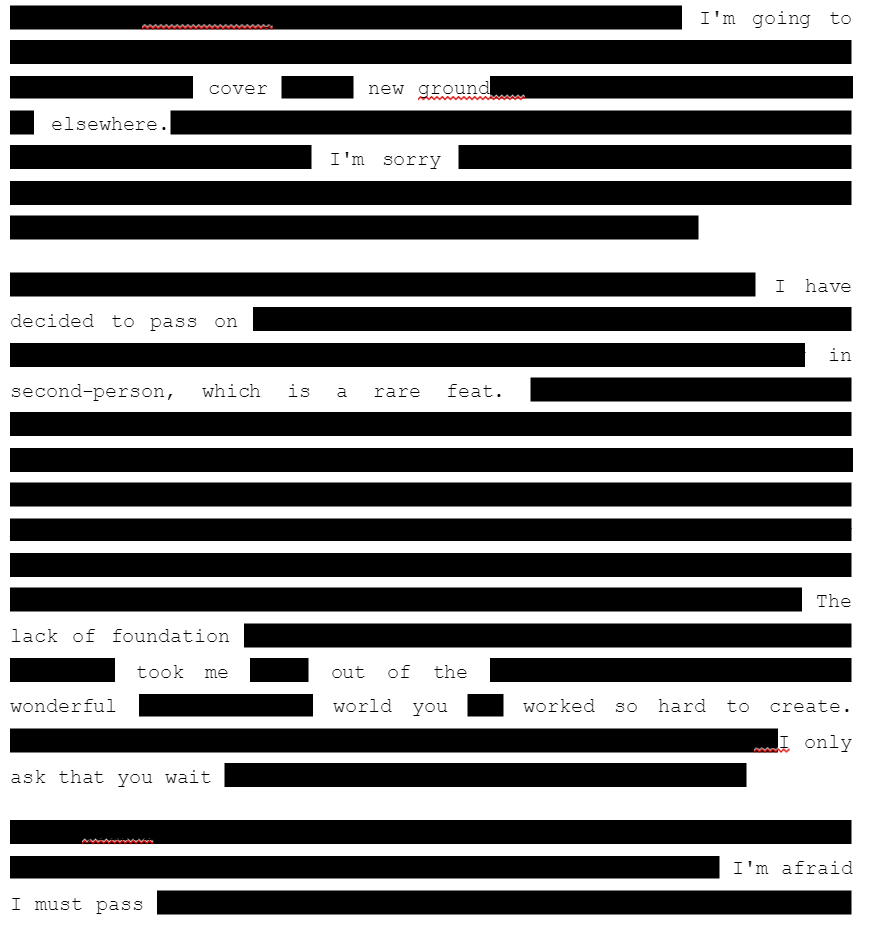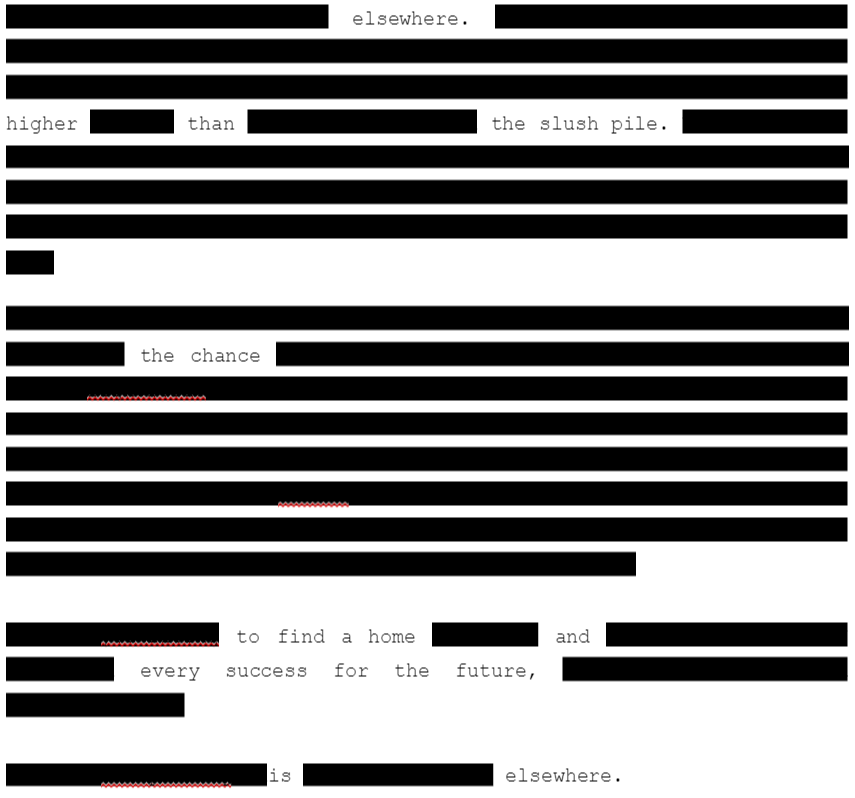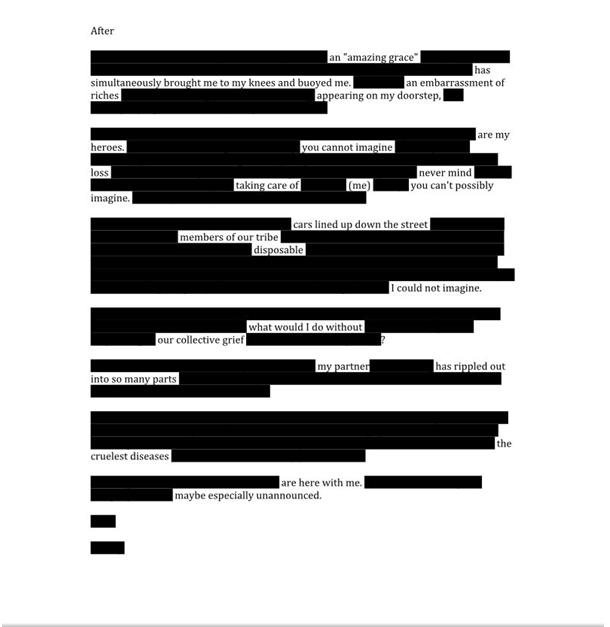The Moon
The last stage of winter is a dreadful madness
cleansed by venom. The wild howls
louder than any beast. Each of them relies
on an occurrence of the hills and their black towers.
The mandible of the sun, the beetles that bear
on their backs the silence, each of them derive
one formula from another, one latter from a former.
A scope line—a metal that echoes in the throat
of iniquity. Baulked, the will: dead traditions
fill with ancestral loathing. A justification
for the new and yet illegitimate 11, 14, 15, and 16
are not in themselves wrong but nevertheless
the only still place—their threshold. What may excite,
what may become of the heart, an assumption
introduces the sacred abomination—a genuinely
contradictory pair. Strictly speaking, the main operator
tries to use a second horseshoe, but both places
plainly exhibit the art of producing rather than a point.
Before the human eye, darkness conquers air.
The benign intoxicates and terrors assail.
At midnight the morrow buds, the back of the head
resurrects. The nameless, the moon
transits through a poisoned darkness.
A Glance. A Formula. A Barrier. An Elimination Rule.
How splendid this adventure!
Source texts: Simpson, R.L. Essentials of Symbolic Logic. Broadview Press, 1999. Crowley, Aleister. The Book of Thoth. Weiser Books, 1974.
The Sun
White spruce will not do.
A novice could dig a set of cobbler’s stitches,
a strip of sand and even a pebble beach,
if terrestrial matters are valid. It’s just that
an idea is like a rose thorn. An idea with 12 rays
where children twin symbolism with dancing,
the ancient ones, those outside the wall
where the fertile earth speaks are dead
and remain; nothing aspires to the heavens.
Once there had been a chosen belt,
a girdle to render infinite space. Like sacred
signs on their feet, the strange, the formula
of a close and definite alliance, our
ancestors were bewildered enough
to gain a foothold. Upsetting as it is,
the pioneers can put nothing right.
We tied almost nothing. Thongs, ropes,
and strings, It seems to slide on oil.
There is no sign of It. The arrow of a wake.
The riparian forests temper. The wind
ruffles our shirts with It. The surface of It
appears scratched with the end of the Eagle.
A cruising loon leans forward and gives
to It. As a consequence, the land widens again
under the sun. The narrow waters lead on,
and the lake comes at us hard
down the solar alley. After a swift execution
Green rose, time leaked from the sun, and thus
sanity flowered from freedom. It burnt Itself
on the 13th ray and then flew past, laughing.
Source texts: McPhee, John. The Survival of the Bark Canoe. Farrar, Straus, Giroux: New York, 1975. Crowley, Aleister. The Book of Thoth. Weiser Books, 1974.
The Star
To live sweetly on the verge of the unbelievable
It is nothingness with twinkles
there is distance and oil and blood
there is ethereal water
there is the land and the water
there are roses, the Grail and the Alchemist
continuous and omniform, smoke is not measured by clocks
years are not numbered by wars
a bell rings for every thought in Its head, a light goes on
for Its approaching words
out of the rain and the darkness and the depths
there are fires of glory, of fury, sudden and lingering
put It on the wings, arouse the coiled splendour
to It the rich headdress
to It the secret temple, the flame of drunkenness
to It the rich jewels of the night
It wrote in and out of the anatomy of the word
the word that became genteel, then self-conscious
finally dying of contempt, It said
snow is measured by winters
there is a definite formula for the attainment
of truth, but ‘ware, the new revelation
is not Euclidean. Know this,
the veil before the face, the picture spirals
what is conceived is mathematical
there are roses growing with thorns angled toward the sea
Source texts: Merton, Thomas. Raids on the Unspeakable. New Directions: New York, 1964. Crowley, Aleister. The Book of Thoth. Weiser Books, 1974.
The Universe
Nothing is fully expanded and yet the universe of discourse
signs Itself as a fold. The beam of light integrates. Portable
immersive technologies are 22 paths pendant from the symbol.
Space self-compensates for the slowest of planets. Strain
and stress radiate: coldness, dryness, immobility, dullness—
this chemistry returns to the beginning. We are all driven
by inaccessible mechanisms. Neural landscapes are graphic,
pill-like entities. Particles are written in Sicily. The eeries
of letters begin and then end. In the end of It all The Fool
compliments the place where feet fall upon the material.
The beam of light disintegrates. The Modern—the Now—
a museum interior whose hard-edged geometry is nothing,
fully expanded.
Source texts: Stafford, Barbara Maria. Echo Objects: The cognitive work of images. The University of Chicago Press: Chicago & London, 2007. Crowley, Aleister. The Book of Thoth. Weiser Books, 1974.
After a wildly productive life as an alchemist, Carol Shillibeer retired to read tarot, stalk Hierocholoë odorata in the lands west of the Pacific cordillera, and consider the implications of post-human materialism.


